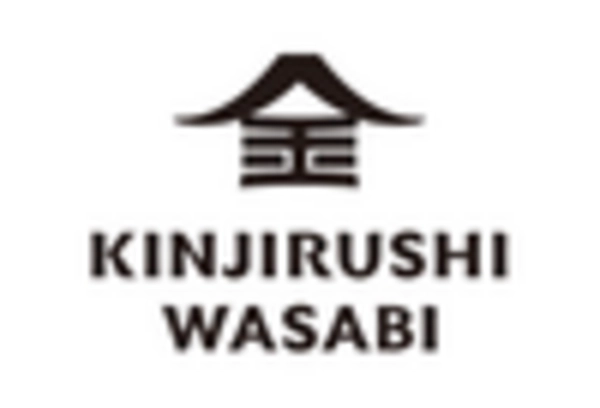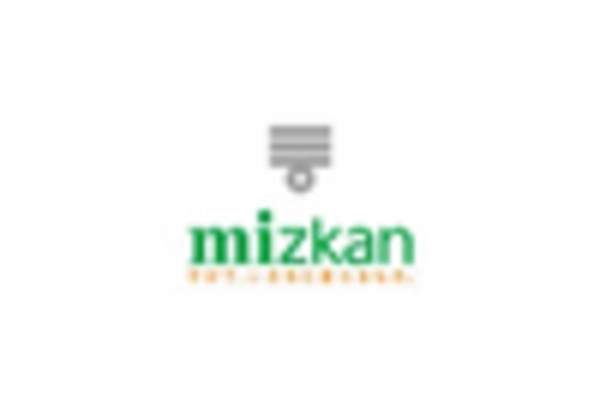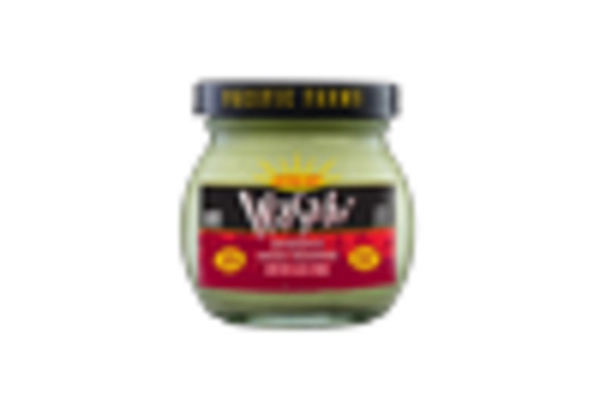Market Share
Introduction: Navigating the Competitive Landscape of the Wasabi Market
During the course of the evolution of the wasabi market, competition has been influenced by technological development, changing consumer preferences, and changes in regulations. Agricultural producers, food manufacturers, and speciality retailers are striving for market leadership through product innovation and supply chain improvements. Farmers are using IoT and precision farming to improve yield and quality, while manufacturers are using big data and artificial intelligence to analyse trends and consumer preferences. Retailers are differentiating themselves through their commitment to a sustainable supply chain and unique sourcing. A critical differentiator for market positioning is the integration of green production and automation. Opportunities are emerging in North America and Asia-Pacific, driven by the rising demand for authentic experiences and health-conscious products. For the period 2024–2025, the strategic trend is to increase the traceability of products and expand the distribution channels to take advantage of this trend.
Competitive Positioning
Full-Suite Integrators
These vendors offer a comprehensive range of wasabi products, catering to diverse consumer needs and preferences.
| Vendor | Competitive Edge | Solution Focus | Regional Focus |
|---|---|---|---|
| Oregon Coast Wasabi | Authentic, locally sourced wasabi | Fresh wasabi products | North America |
| The Wasabi Company | Specializes in premium wasabi varieties | Gourmet wasabi products | Global |
| Kinjirushi Wasabi Co. Ltd. | Traditional Japanese wasabi expertise | Authentic wasabi paste and powder | Asia, North America |
Specialized Technology Vendors
These vendors focus on innovative wasabi cultivation and processing techniques to enhance product quality.
| Vendor | Competitive Edge | Solution Focus | Regional Focus |
|---|---|---|---|
| World Wasabi Inc. | Advanced cultivation methods | Fresh wasabi and related products | North America, Asia |
| Real Wasabi LLC | Sustainable farming practices | Fresh wasabi rhizomes | North America |
Infrastructure & Equipment Providers
These vendors supply essential ingredients and products that support the wasabi market ecosystem.
| Vendor | Competitive Edge | Solution Focus | Regional Focus |
|---|---|---|---|
| Pacific Coast Wasabi | Local sourcing and distribution | Wasabi products and ingredients | North America |
| S&B Foods Inc. | Established brand with diverse offerings | Wasabi sauces and seasonings | Global |
| Silver Spring Foods Ltd. | Wide range of condiment products | Wasabi and horseradish products | North America |
| Eden Foods | Organic and natural product focus | Wasabi and specialty foods | North America |
| Wasabi essentials Ltd. | Focus on health-conscious consumers | Wasabi-based health products | Global |
| Wingreens Farms | Farm-to-table approach | Fresh wasabi and related products | India, Global |
Emerging Players & Regional Champions
- Wasabi Farms, a specialist in organic wasabi cultivation in hydroponics, has recently been contracted by a major Japanese restaurant chain to supply them with wasabi. It is now offering a sustainable, local alternative to the traditional supplier.
- Green Wasabi (Japan): Green Wasabi is a company that specializes in developing wasabi through processing. It has teamed up with a food science start-up to develop wasabi-flavoured snacks. It is a complement to established wasabi suppliers by offering a diversified range of wasabi-flavoured products.
- Wasabi World, Canada: a manufacturer of wasabi-based sauces and condiments, which has just launched a new line of wasabi dressings in collaboration with a popular health food brand. Wasabi World is now competing with the established condiment makers.
Regional Trends: By 2025, the wasabi market was shifting to organic and sustainable cultivation, especially in North America and Japan. The growing preference for local products was driving a growing interest in hydroponic cultivation. The trend towards healthy and natural products was also driving the development of new wasabi products.
Collaborations & M&A Movements
- Wasabi and Google Cloud have teamed up to combine Wasabi’s hot cloud storage with Google Cloud’s data analytics tools. The aim is to increase the data-access and analysis capabilities of enterprise customers, thus strengthening their position in the cloud-storage market.
- AWS has acquired Wasabi’s rival, Backblaze, in a strategic move to strengthen its position in the cloud storage market and offer more comprehensive services to its customers. This could change the balance of power in the industry.
- IBM and Wasabi Technologies entered into a collaboration to provide hybrid cloud solutions that leverage Wasabi's low-cost storage with IBM's AI and analytics services, enhancing their value proposition in the enterprise market.
Competitive Summary Table
| Capability | Leading Players | Remarks |
|---|---|---|
| Biometric Self-Boarding | Clear, SITA | In several American airports, Clear has already introduced biometric boarding, which has improved the flow of passengers and reduced waiting times. SITA’s Smart Path technology is being used in a number of international airports, where it has proved its scalability and its effectiveness in reducing boarding times. |
| AI-Powered Ops Mgmt | Amadeus, IBM | Amadeus uses artificial intelligence to optimize flight schedules and resource allocation, resulting in improved efficiency. IBM’s Watson has been integrated into airport operations for predictive maintenance, and is proving to be uniquely strong in data analytics and machine learning. |
| Border Control | Gemalto, Thales | Biometric control systems from Gemalto are widely used throughout Europe, increasing security and speed at the border. Thales has developed a facial recognition system that has been successfully used in several busy airports, improving the accuracy of identity checks. |
| Sustainability | Airbus, Boeing | Airbus is a leader in the development of sustainable aviation fuels (SAF), and through its partners, aims to reduce carbon emissions. Similarly, in the ecoDemonstrator program, Boeing showcases new technologies that improve the energy efficiency and the performance of aviation operations. |
| Passenger Experience | Delta Airlines, Singapore Airlines | The most advanced and personal passenger services are provided by Delta Air Lines through its mobile app and in-flight entertainment system, which has increased the level of satisfaction for passengers. Singapore Airlines is known for its high quality service and its cabin design, which is a model for others to follow. |
Conclusion: Navigating the Wasabi Market Landscape
The wasabi market in 2025 is characterized by high competition and significant fragmentation, and both old and new players are competing for market share. Regionally, consumers are increasingly demanding authentic, sustainable, and traceable products, and vendors are responding accordingly. In particular, established vendors are leveraging their brand equity to compete in this new environment, deploying advanced capabilities such as automation and artificial intelligence to increase operational efficiency and customer engagement. Emerging vendors, meanwhile, are focusing on delivering sustainable and flexible products to differentiate themselves in this crowded marketplace. In the future, the vendors that are able to integrate the most advanced capabilities—such as the use of artificial intelligence to enhance their ability to predict customer behavior, and automation to improve their ability to respond to those needs—will be the ones that establish themselves as leaders in this evolving market. The key to success, then, will be for vendors to be nimble and able to respond quickly to shifting consumer preferences.


















Leave a Comment